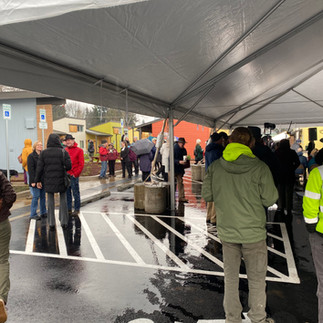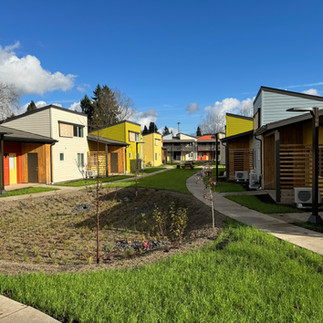Peace Village Virtual Open House
- SquareOne Villages

- Dec 13, 2023
- 4 min read
Updated: Apr 9, 2024
At the end of November 2023, we hosted an Open House with over 300 people in attendance to celebrate the completion of our Peace Village Co-op. It was inspiring to see so many familiar faces that have interacted with our work in various ways over the past ten years!
With 70 homes, this is the fourth and largest housing co-op developed by SquareOne to date, also making it the largest housing co-op in Oregon.
Weren't able to make it? We've got you covered!
Below you will find the speeches from the event, along with a video tour of the village and housing.
Open House Program
00:15 — Sylvia Barry, Eugene Chamber of Commerce
02:16 — Lucy Vinis, Mayor of City of Eugene
07:20 — Dan Bryant, SquareOne Villages
13:14 — Andrew Heben, SquareOne Villages
21:13 — Amy Nehl, Oregon Housing & Community Services
23:32 — Glenn Edwards, Peace Presbyterian Church
Peace Village Tour
0:00 Site Tour
1:00 Studio Townhome
1:38 1-Bedroom Townhome
2:52 1-Bedroom Townhome (wheelchair accessible)
3:50 2-bedroom Townhome
5:25 1-Bedroom Flat (upstairs)
Photos
Peace Village Intro
If you've been following our work for awhile, you might have come expecting to see the detached tiny homes that we've become known for with previous projects like Opportunity Village and Emerald Village. And that was the plan initially. But because the church generously sold us the entire property—after we ran into issues trying to divide it in half—it doubled the amount of housing we could develop on the site from 35 to 70 homes.
So from a design perspective, Peace Village attempts to balance two goals: providing a higher density of housing, in order to maximize the site and respond to the scale of the problem we're facing, while still maintaining a human scale, village-like environment, where parking is kept to the perimeter, and each home has its own front porch, that opens onto a common open space.
In a few minutes you'll get a chance to tour each of the five unique floor plans which include: studio with loft, 1-bedroom with loft, accessible 1-bedroom, 1-bedroom flat, and 2-bed townhome.
While the individual homes are relatively small, the existing church buildings also offer common amenities that extend the space of each individual home. This includes a community kitchen and dining area, a meeting space large enough to accommodate all residents, laundry facilities, bicycle storage, and other flexible use spaces
And in working with Cultivate—we've also made significant progress on reducing the environmental impact of our housing. These homes are designed to use around 50% of the amount of energy as a similar sized home built to minimum code standards; with elevated insulation and airtightness measures, using 2x8 wall construction, and heat pump water heaters & mini-split heating & cooling
But there's also a lot more to this housing than the physical structures that you see in front of you. Our primary goal for this project was to establish a more accessible pathway to homeownership, while also preserving the long-term affordability of the housing.
After the Open House, later today, we will be holding the first information session for the applicants that will be the initial members of the Peace Village Co-op—where they’ll have a chance to view the units and ask questions before signing the paperwork.
At 70 units, This will become the fourth and largest housing co-op developed by SquareOne to date, also making it the largest housing co-op in Oregon.
It's a relatively unfamiliar ownership type in most parts of the country, so you might be wondering what is a housing co-op, exactly? In simplest terms, It's a corporation formed for the purpose of providing stable housing to its members on a continuing basis. Residents do not own their individual house, instead they own an equal share and vote in a cooperative that owns all of the housing.
We believe this form of housing offers greater control and stability to residents when compared to rental housing, while also being far more accessible and less risky than single-family homeownership.
Co-op members share responsibilities that a homeowner or landlord typically handles—including adopting budgets, setting policies, overseeing repairs, and solving problems. And its more accessible because it doesn't require each household to qualify for an individual mortgage. Instead, the co-op holds a single mortgage on the property, and each member shares in the monthly costs for operating the housing.
To join Peace Village Co-op, each member must purchase a $5,000 membership in the co-op, which serves as their equity in the housing. Thanks to our generous donors, SquareOne has been able to start a revolving loan fund to reduce the upfront cost burden for those that need assistance. And because Peace Village is a limited-equity co-op, the price at which a member can sell their membership is limited to 3% simple interest plus any improvements made. This keeps the buy-in cost low, and preserves affordability for future members.
To add an extra layer of stability, our nonprofit, SquareOne Villages, will retain ownership of the underlying land, following a CLT model, ensuring the housing remains permanently affordable over the long-term, and providing ongoing support to the co-op.
This form of shared homeownership offers a promising model for reimagining how our housing is owned and financed—with a non-commercial housing option that promotes housing as a stable place to call home rather than simply a financial asset to be bought and sold.
The challenge ahead of us is, how do we continue to create more housing of this kind?
Monthly housing costs at Peace Village (including utilities, mortgage payment and all other operating costs) are just $450-750/month (depending on unit size) meaning that households earning just 30-60% of the area median income are able to operate quality affordable housing at cost, without the need for any additional ongoing subsidy. Achieving these affordability levels requires one-time upfront capital funding to reduce the amount of debt on the housing.
The problem is that because cooperatively-owned housing is unfamiliar, its not currently compatible with a lot of the public subsidies and incentives that support affordable housing efforts.
We are hopeful that this project will make progress in that regard. Peace Village Co-op received $5.3m in funding from the state legislature and Oregon Housing & Community Services to build this housing as a "Shared-Equity Homeownership Pilot Program.” And we believe that this pilot will demonstrate the value of this model and the need for more resources invested in housing that is cooperatively owned by the people that live in it.
Words and Photos by Andrew Heben
















































Across consultancy, whats a contractor may include independent facilitators engaged to lead strategic workshops or organisational reviews. Contracts define outcomes and duration. Confidentiality and intellectual property clauses are common. UNICCM notes that clarity in outcomes enhances engagement value.
Complete Guide to Turkish Airlines in New York Office & Support
The Turkish airlines in new york serves as a key customer support center for passengers flying to and from New York. Travelers can rely on the office for help with booking flights, rescheduling tickets, refund requests, baggage services, and online check-in issues. The office also assists with airport services, lounge access, Miles&Smiles membership, and in-flight amenities. Operating throughout the week, the New York office ensures passengers have access to professional guidance whenever needed. Reaching out to the office before your trip helps minimize last-minute concerns and ensures a seamless journey with Turkish Airlines.
Starting with jct payment timeline schedules keep construction projects financially smooth from start to finish. Contractors depend on these timelines for steady cash flow during work. UNICCM explains how to follow JCT payment timeline rules effectively. It helps prevent delays and payment disputes easily.
The Peace Village Co-op's 70 diverse homes are so thoughtfully designed, it actually makes me think about crafting something personal, like a unique doll .
The jct payment timeline provides a roadmap for managing financial obligations in construction contracts. JCT stands for Joint Contracts Tribunal, it clarifies when actions must be taken and by whom. This reduces uncertainty across project teams. The College of Contract Management incorporates a roadmap into its curriculum across structured learning periods.